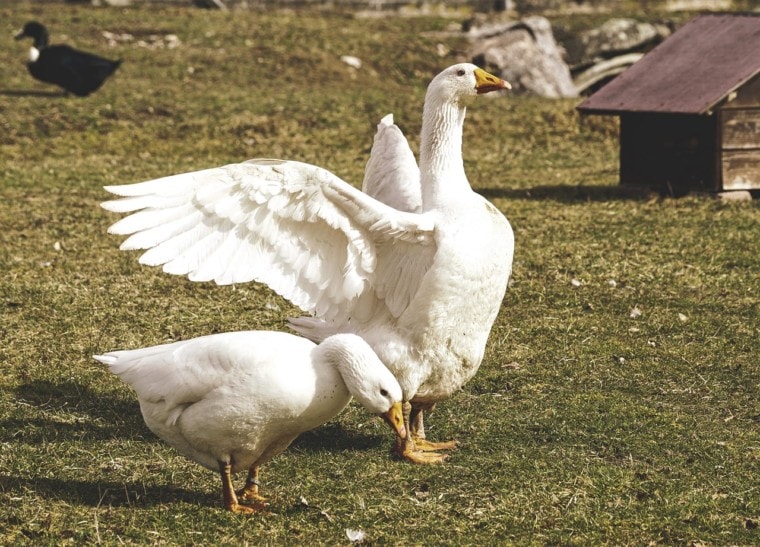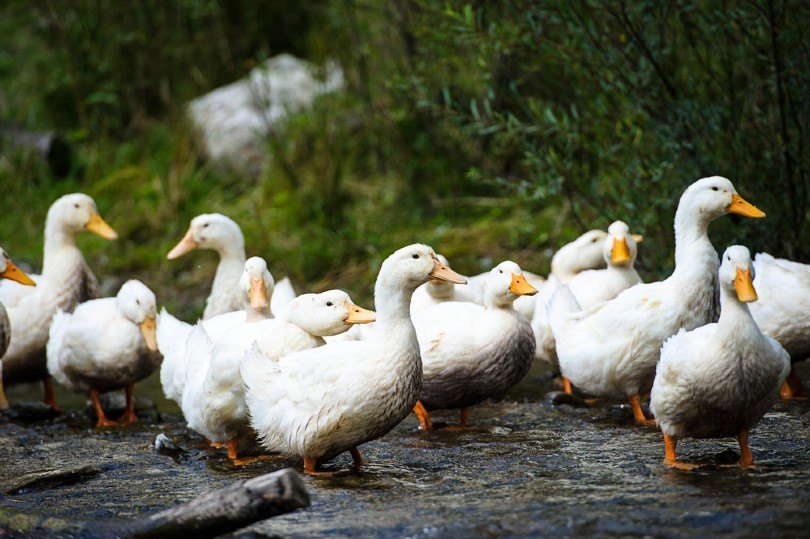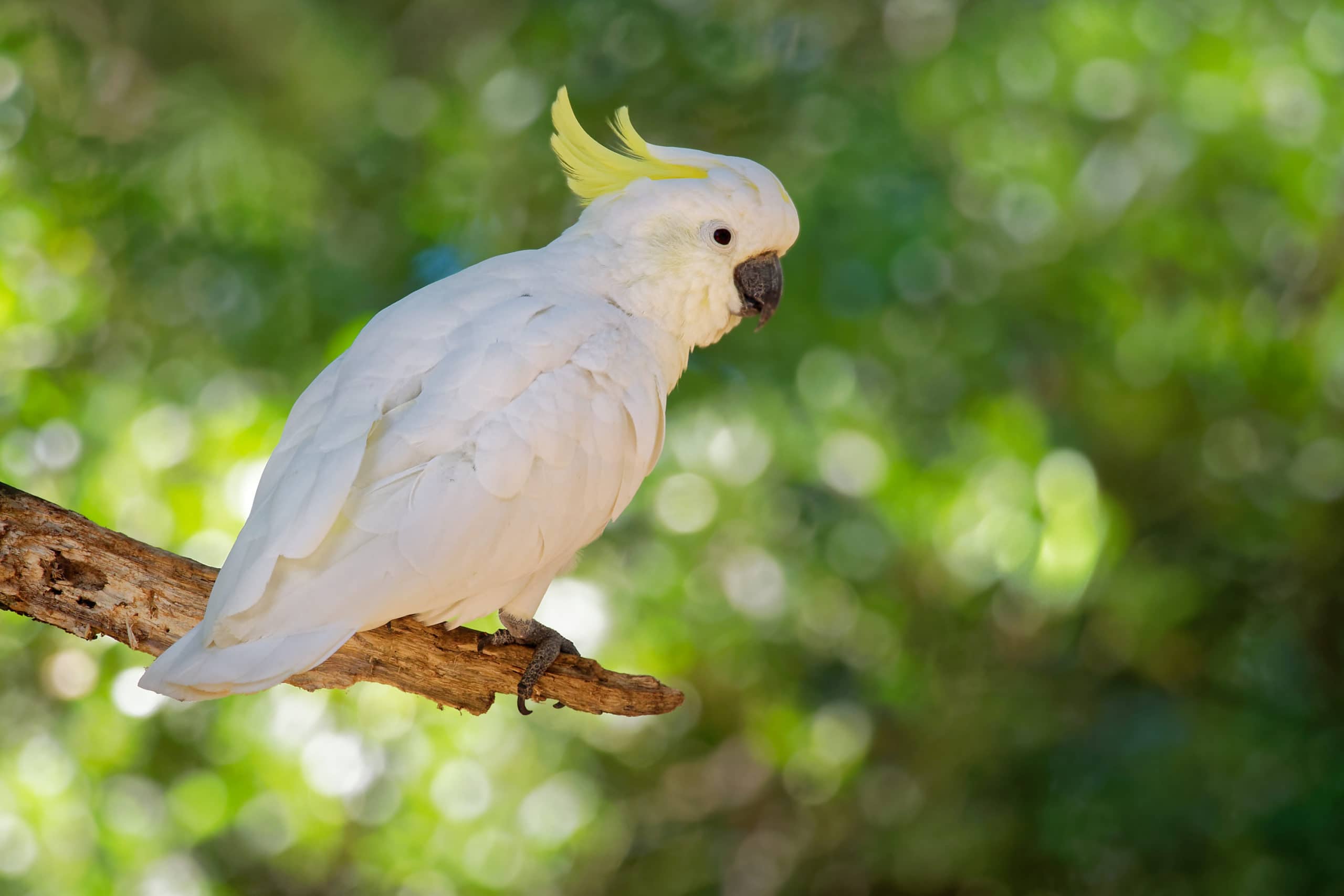
Ducks are adorable and social little creatures that people of all ages love. Maybe you too love ducks and have been wondering if you could keep one as a pet.
I’m here with great news. You can definitely keep a duck as a pet! Read on to learn more about these little cuties and how you can best take care of them as pets.
What Should I Feed My Duck?
In some areas, you can buy feed specially formulated for waterfowl. If this isn’t available to you, regular chicken feed will work, but it is recommended to add brewer’s yeast in a five percent ratio to supplement niacin.
Greens are also a vital part of a duck’s diet. Ducks can be picky and often will not eat wilted greens, so placing the greens in their water trough or pond can help keep the greens nice and fresh. Ducks enjoy sweetcorn, lettuce, frozen peas, and oats.
Ducks also need lots of fresh and clean water. Be sure to always keep their waterer stocked with fresh water to avoid dehydration.

How Do I Take Care of My Duck?
Duck feed should be stored in a cool dry place. You should feed your ducks daily with their pelleted food in the morning. If there is any leftover food at the end of the day that has gotten wet it should be discarded. Ducks should also have access to clean water at all times.
Ducks should not need to be bathed as long as they have access to water in which they can submerge themselves. They will then be able to keep themselves clean that way.
Ducks do tend to be messier than other birds, so it is recommended that you clean their house whenever it becomes too muddy or dirty. By building a shelter that is easy to clean, you will make both your life and your ducks’ lives easier.
If you plan on raising your ducks for eggs, be sure that they are receiving proper nutrition. You should also make sure that there is adequate room in their shelter for them to lay eggs. There should be at least 4 square feet per duck. Supplying the house with a thick layer of straw will also benefit the ducks in their egg-laying as they like to cover their eggs with a layer of straw.

How Do I Know If My Duck Is Sick?
Overall, ducks are very healthy and hardy animals. But there are some illnesses that you should keep an eye out for in your ducks.
Bound crop. The crop is a part of a duck’s digestive system. The crop can become impacted by long grasses, strings, or other foreign objects. To identify a bound crop, examine your duck’s neck and see if it looks swollen or lumpy.
Avian Cholera. This disease originates from bacteria found in unclean and standing water. To prevent this disease be sure to frequently clean your duck’s water. Symptoms of this disease include diarrhea, loss of appetite, and labored breathing.
Bumblefoot. When a duck’s foot is injured from a cut or splinter, it can develop a staphylococcus infection. Signs of this include a black scab on the bottom of the foot. If caught early this disease can be treated with Vetericyn.
Botulism. Another disease that is caused by bacteria found in stagnant water is botulism. Symptoms of this serious disease include diarrhea, difficulty walking, drooping wings, and vomiting.
If your duck is exhibiting any out-of-the-ordinary symptoms, you should contact a veterinarian right away. Most diseases can be treated if diagnosed early on.
Duck Facts
Duck is the common name for a number of different species of waterfowl with short legs, blunt and broad bills, webbed feet, and an adorable walking waddle. Almost all species of duck today relate back to the wild Mallard.
It is unknown exactly when people began domesticating ducks, but it is estimated that they were first domesticated in China around 2,000 to 3,000 years ago. Unfortunately, until the 19th century, ducks were kept for their meat and not for their eggs or their companionship.
When we think of common ducks, we usually think of what are called dabbling or freshwater ducks. These types of ducks make up about 38 species of ducks including the well-known Mallard, the black duck, the pintail, and the spoonbill.
Male ducks are known as drakes and females are known as hens. Drakes are typically larger than hens and tend to have more dramatic plumage. Hens have more muted colors and are very vocal, quacking loudly and often.
While wild ducks only live an average of 5–10 years, pet ducks can live up to 20 years! This means taking on a pet duck should be a serious decision as you will be taking care of this animal for up to two decades!

Do Ducks Make Good Pets?
One of the most important things to research before purchasing any ducks is the local laws regarding owning poultry. Some cities and HOAs allow poultry to be kept at your house, but some make it illegal. It would be a horrible occurrence to form an attachment to your ducks and then be required to give them up.
If you can legally keep ducks on your property, they can make wonderful pets. Ducks are incredibly social creatures so you should always have more than one duck. Ducks get along well with each other and with other birds.
Ducks have unique personalities and part of the fun of owning ducks is getting to know each of your ducks on an individual level. You can find out what types of treats they enjoy and what interactions they like to have.
If you handle your ducks frequently starting at an early age, they are very fun to interact with. Ducks enjoy petting and snuggles. They also can learn commands and play with toys.
Due to a duck’s high intake of water, they do produce a lot of manure. This is something important to consider when purchasing a duck and building their living set-up.
Where Can I Get a Pet Duck?
There are a few different places that you can purchase or adopt a duck. Local feed stores will often have ducklings for purchase. You can also call local animal shelters and rescues as they also sometimes have ducks for adoption.
Maybe you’d like a more natural experience relating to ducks and don’t want to outright purchase one. This is a possibility too! Wild ducks can be attracted to your property if you have a marsh, pond, or sometimes even just a pool!
Attract a wild nesting pair of ducks by putting up a nesting structure well before breeding season if you have a pond or marsh on your property. Ducks of both urban and wild nature have been known to nest in these artificially made structures. These nesting structures will help protect the wild ducks from flooding and from ground predators.

How Much Does It Cost to Own a Pet Duck?
You can usually buy ducklings for around $5 apiece at your local feed store. Adopted ducks can range from $10–$50 for an adoption fee or sometimes even free if a special is going on at your local rescue or animal shelter.
A pen or cage for your ducks can run you around $100–$200 for a new setup. If you use materials you already have around your house, such as old lumber and an unused dog house you can save even more money.
The cost of feeding one duck for the year is around $100. Feeding setups range from around $20–$50. Ducks are messy eaters so having a feeding set up will help save feed from being wasted.
Ducks are considered “exotic” animals to most vets and may require a higher examination fee to be seen at a vet. Most rural vets are used to seeing ducks and other livestock and will not likely charge a higher fee. The typical examination fee for an animal at a vet is $45–$55.

What Kind of Home Does My Duck Need?
Duck housing can range from a very simple set-up to very elaborate housing. One of the most important purposes of a duck house is to protect your ducks from predators. For the house, you can use anything from a dog house to a custom-built shed, or even a gardening shed. Just make sure that the structure has a floor separate from the ground to keep predators out and to keep your ducks dry.
Ducks don’t need roosting bars as chickens do. They prefer to make their nests directly on the floor. Be sure to provide straw or other bedding for the ducks to make their nests.
As for the size of your duck house, you should allow four square feet of space per duck. Ducks need their own space and don’t like to be closely crowded together. You should also allow for ventilation in the duck house.
Ducks also love to swim, so you should try to set up a small pool for them to get their exercise in. Be sure to clean it frequently to keep your ducks healthy and happy.
Ducks also love to play with toys. While it is difficult to find toys specifically marketed to ducks, parrot toys such as bells and mirrors work great as well as large dog chew toys as ducks like to nibble on things.
For feeding and watering your ducks, you should try to keep their “play” water separate from their drinking water. A waterer for chickens will work great for ducks as well. For their feed, a small trough or even cut PVC pipe will work well.
Conclusion
Overall, it can be a very rewarding experience to own ducks. It is a lot of fun playing with and getting to know your ducks on a personal level. Even just watching your ducks interact with each other can be a calming activity for you. If you are ready to start your own flock, be sure to consider the long life span of these birds and the care and love it will take to own them.
See also:
- Is Dawn Dish Soap Safe for Ducks? Is It Effective for Cleaning?
- How to Tell the Age of a Duckling (With Pictures)
Featured Image Credit: Pixabay











